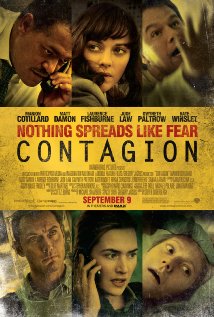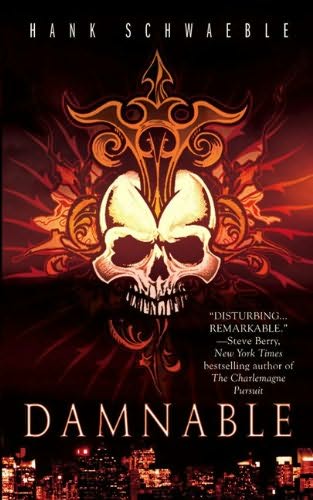
Steven Soderbergh
 Steven Soderbergh directs a cast full of A-list Hollywood celebrities in the recently released Contagion. Playing into fears that to some extent are natural, while at the same time too often stoked of late by government fearmongers, it tells the story of a new virus that spreads quickly and wreaks havoc on the human race. Some very recognizable faces of the Hollywood elite turn splotchy and froth at the mouth.
Steven Soderbergh directs a cast full of A-list Hollywood celebrities in the recently released Contagion. Playing into fears that to some extent are natural, while at the same time too often stoked of late by government fearmongers, it tells the story of a new virus that spreads quickly and wreaks havoc on the human race. Some very recognizable faces of the Hollywood elite turn splotchy and froth at the mouth.
Comparisons will be made to Wolfgang Petersen's Outbreak, but beyond the subject matter and big name actors, they do not much resemble one another. Contagion is either a well-researched and realistic movie about the response to a worldwide infectious disease — especially realistic at the level of government agencies like WHO and CDC — a carefully crafted fraud that makes you think it is, or a mix of the two. There are multiple storylines and it feels, at times, like a documentary. Outbreak is more fanciful and less earnest, investing little effort and less concern in realism but a good deal more in story. All things considered, I would say that Outbreak is the superior work, but Contagion is good in every aspect in which — one gets the feeling — it bothered to put in some elbow grease and is worth a viewing at the theater.
Where did it put this elbow grease? In the shots, in the blocking, in the photography, in the acting, in the editing — everywhere but the script. As one would expect from a Soderbergh film, it is well shot. Everything around the story works at a higher level than what you usually find in theaters nowadays. It has a good solid skeleton, healthy skin, strong muscles, even a brain, but it lacks a heart.
Perhaps it is a bit unfair to say that no elbow grease was spent on the script. I do not mean to give the impression that the screenwriter was incompetent. It was, as I said, either a well-researched flick or a good facsimile, either of which takes some work and skill. However, the type of story it tells, and the time it has to tell it, limit how emotionally invested we can become in the characters, which in turn limits how engrossed we can be in the action, the obstacles, and the resolution.
[continue reading…]
Help Promote Prometheus Unbound by Sharing this Post

Hank Schwaeble
 Damnable, by Hank Schwaeble, has been called noir, but anyone who has seen The Third Man, Double Indemnity and The Asphalt Jungle will see no more than a tenuous connection to what noir originally was. Just like the word libertarian often gets applied to anyone who is pro-choice on two or more issues, noir gets thrown at any tale with a dark atmosphere, a detective and/or so much as a single morally ambiguous character, resulting in an abundance of wrongly labeled people and stories. Damnable, winner of the 2009 Bram Stoker Award, is not noir any more than Bill Maher is a libertarian; it is a mix of detective tale, supernatural story full of demons and cultish rituals, and MMA-style fighting and action.
Damnable, by Hank Schwaeble, has been called noir, but anyone who has seen The Third Man, Double Indemnity and The Asphalt Jungle will see no more than a tenuous connection to what noir originally was. Just like the word libertarian often gets applied to anyone who is pro-choice on two or more issues, noir gets thrown at any tale with a dark atmosphere, a detective and/or so much as a single morally ambiguous character, resulting in an abundance of wrongly labeled people and stories. Damnable, winner of the 2009 Bram Stoker Award, is not noir any more than Bill Maher is a libertarian; it is a mix of detective tale, supernatural story full of demons and cultish rituals, and MMA-style fighting and action.
This is not to denigrate the work — or Bill Maher — but merely to put it in its proper category. As a story it is a modest success, not profound perhaps, but also without pretensions of depth and nuance. On the first page, a character muses, “Coffee was like pizza and sex — no matter how bad it was, it was usually still pretty good.” In other words, the author is decent enough to tell us straight away we will not be wrestling with complex ideas and weighty issues. When a zombie attacks a few paragraphs later, it is the author letting us know what we will be doing.
I enjoyed my time with the novel, which I believe is all the author ever wanted for his readers. I know I enjoyed it because I put my book mark in the sequel as soon as the last page was turned. The main character, Jake Hatcher, is something more than one dimensional, interesting from the outset. His situation is intriguing, his history morally ambiguous, and his abilities perfect for the action to follow.
We first meet Jake as a convict in a military prison. One of his jailors has it out for him, and Jake suspects his cellmate has been recruited to pick a fight with him, to get him in trouble so his term can be lengthened. There is also another trap his jailor has set for him, and while he tries to navigate these he gets a call from his mother telling him his brother has died, an event we saw in the prologue.
[continue reading…]
Help Promote Prometheus Unbound by Sharing this Post
 Steven Soderbergh directs a cast full of A-list Hollywood celebrities in the recently released Contagion. Playing into fears that to some extent are natural, while at the same time too often stoked of late by government fearmongers, it tells the story of a new virus that spreads quickly and wreaks havoc on the human race. Some very recognizable faces of the Hollywood elite turn splotchy and froth at the mouth.
Steven Soderbergh directs a cast full of A-list Hollywood celebrities in the recently released Contagion. Playing into fears that to some extent are natural, while at the same time too often stoked of late by government fearmongers, it tells the story of a new virus that spreads quickly and wreaks havoc on the human race. Some very recognizable faces of the Hollywood elite turn splotchy and froth at the mouth.



